
Here s for the second installment of my review of this past year s Summer of Code at Debian. See the previous part here:
Debian Summer of Code 08 : Where are they now (part 1/3).
I apologize for being so late at getting this second part out but I have been very busy. Still, I ll get the last part out before FOSDEM. Those of you who ever had to write a Java compiler (ok, Java subset, but the OOP part was here ) in brainfucking Ada will understand what I went through working on two of my most loathed languages.
Debian NAS, improve support of Debian on NAS devices
Presentation
There is a large range of inexpensive Network storage devices available on the market. For some of them, such as
Linksys NSLU-2 and
Thecus N2100, we have added support, but there is many many more devices we could support. For this summer we look forward at supporting multiple Marvell Orion based devices (as outlined in Martin Michlmayr s talk
Running Debian on Inexpensive Network Storage Devices), such as Revogear Kuro Box Pro, Buffalo Linkstation, QNAP TS-109+,
If you don t have old computers lying around to turn into NAS servers, you need to sleep at night without the soothing sound of computer fans or if you actually pay your own electricity bill, you might want to have a look at standalone NAS devices. They re cheap and can be made vastly more capable by slapping a Debian on it. If you ever heard of DD-WRT, you know the spirit.
The project was mentored by Riku Voipio, with help from Martin Michlmayr. The
project proposal (sorry, Google cache) was introduced by Martin, who did a presentation about it the previous year at FOSDEM.
Student
Per Andersson was a 24 year old student working towards a MSc in computer science at Chalmers University of Technology in Sweden.
He had been
looking for ways to join Debian but with school still being priority one, he didn t find time to dive in.
Result
This project was successful. The Kurobox Pro is now supported and several useful tools were packaged to make life easier with these NAS devices. Martin Michlmayer is still working on Debian NAS related stuff.
Per was happy to be invited to the Emdebian work session in Extremadura and has been active within debian, maintaining the packages he created during the Summer of Code.
Cran2deb, generate Debian packages from R packages
Presentation
GNU R has become the preeminent platform for computing with data . The
CRAN archives contain over 1300 source packages of very high-quality, and
BioConductor has again almost as many focuses on bioinformatics. We want more of these in Debian, and going beyond the 50+ packages we currently have suggests more scripting and automation.
R is a
pretty big among statisticians and all of them they wasted no time writing their own package to work on particular research subject. It s a lot like Perl with CPAN or LaTeX with CTAN. It s always a pain to discovery that a particular R package is not wihtin Debian and having to resort to unmanaged installation of said packages.
The project was mentored by Dirk Eddelbuetel. The project proposal (which is nowhere to be found but seemed to be good) was introduced by Dirk, along with another proposal he did for R.
Student
Charles Blundell is a research student at.. hum.. didn t do my homework about that. Anyway, you can find him around R related projects.
Result
This project was successful. Cran2deb is happilly turning more than 1400 of the ~1500 CRAN R packages, all with correct dependencies. The work has since been
moved to R-Forge. It s working, we re almost there. We just need it to be polished and we ll get a whole bunch of new packages into Debian.
Charles pinged me about the status of Cran2Deb after the previous post. He admits that he hasn t done much about cran2deb recently because of his new position as a research student but hopes to commit again to it soon. I do encourage him to get these R packages into Debian. I had to manually install some packages myself when I had to use R for school because they weren t into Debian and it s not pretty.
Mergemaster, interactively merge changes in configuration files
Presentation
FreeBSD has a shellscript called mergemaster which is used to interactively merge changes in configuration files, based on 3-way diffs. Debian s approach to configuration file differences is much more primitive: either keep the original file, or blow it away (including all local changes) and use the Debian-provided file. It would be nice to get a system such as mergemaster into Debian. Important is to remember that Debian contains two often-used configuration file management systems: ucf, and conffiles; porting mergemaster in such a way that it will be used in both cases would be great.
The handling of configuration files during upgrades has always been a little.. brutal, with the user being asked at gunpoint to make a good decision, lest the upgrade won t continue or configuration files get borked (ever tried automerging nagios configuration files?). Having a less stressful upgrade experience is a good thing since the point of Debian is to make package management a stressless thing.
The project was mentored by, hum, Manoj Srivastava. I have no idea who came up at first with the proposal.
UPDATE:
Wouter Verhelst mailed to say that he made the original proposal.
Student
Max Wiehle was a physics student at the University of Heidelberg. He did a
Summer of Code stint (Archive.org copy..) as a student for Beagle Project in 2006 which, I suppose, was successful. He s been active in the past with Gnome and desktop related projects.
Result
This project was somewhat successful. He posted an update one month into the program with repositories with code to test.
Last commit to the mergecf branch of project was September 19th but it was never merged in. According to Steve McIntyre, it s dead, Jim.
I couldn t find any further public involvement of Max within Debian.
PAS NSS Debian Installer, improve support of PAM and NSS at install-time
Presentation
It would be very important for the Debian allowing the user to configure additional PAM and NSS modules (eg. LDAP, NIS) during the installation process inside the Debian Installer. To do this, we have to provide tools and helpers to modify /etc/nsswitch.conf and /etc/pam.d/common-*, as well as changing the maintainer scripts for the packages libpam-* and libnss-* to apply the required changes at install time using debconf and these helpers.
To be honest, I will probably never use this. I don t do that many coordinated installs in the same place to warrant doing funny authentication with PAM and NSS, and if I did, I would probably use a more elaborate tool to personalize the install, like
FAI. On the other hand, I can see the appeal of being done with authentication mechanisms before the first boot.
The project was mentored by Fabio Tranchitella. The
proposal came from the student.
Student
Juan Luis Belmonte was a computer science student. He worked in a couple of companies in the area of Sarragossa. He is now founding
debug_mode=ON.
Result
This was quite a disappointement after seemingly good work. Although Juan was satisfied with the project, the PAM package maintainer (Steve Vorlon Langasek) was not. He was never asked about this project (but didn t intervene timely either when the accepted projects were announced though). In his words, it was the wrong solution to the problem . You can find his lenghty rationale on the wontfix
bug report that resulted from the project. It really was a problem of communication with the Debian developpers since Juan could certainly have done the right work if pointed to it. Juan didn t ask thoroughly for existing work and Steve didn t publicize his (enough).
That s all for now. The information is quite fragmented I admit. Most of it was pulled from Google, mailing lists, commit logs, blogs, whatever. If some projects are lacking in information here, it s because I couldn t find it readily (which is an issue in itself!).
In my next post, I ll try to give a student point of view of the Summer of Code in general, and more specifically, at Debian. It will be post 2.5/3 since it s getting a little longer than I planned. Release early, release often, as the say.
If you re a student or a mentor mentioned above, feel free to fill any of the blanks in my report. It s much appreciated. You re not a student or mentor mentioned above and have an opinion on how to improve the next Debian Summer of Code ? Feel free to comment.

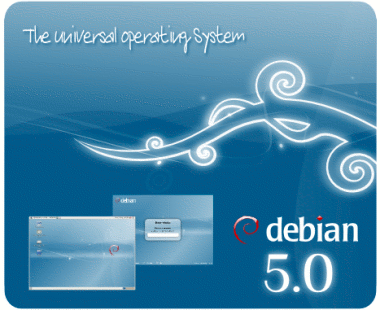
 Here s for the second installment of my review of this past year s Summer of Code at Debian. See the previous part here:
Here s for the second installment of my review of this past year s Summer of Code at Debian. See the previous part here: 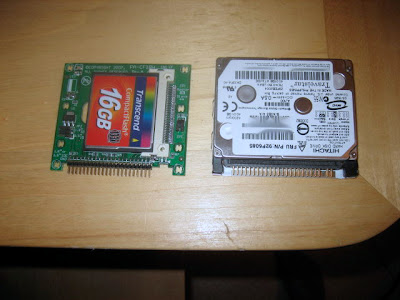
 Per Andersson ported the Debian installer to the Kurobox Pro this summer
as part of a Google Summer of Code project. Along with Riku Voipio, I
acted as Per's mentor and gave him advice while he was trying to figure
out all the details that were needed to get Debian running on the
device. Since I spent the summer in Israel and didn't have my Kurobox
Pro with me, I never performed an installation on my own though.
Yesterday I finally found time to play with my Kurobox Pro. Per did a
great job and the installation worked without any problems. I also
investigated how the recovery mode works and added various new
information to my
Per Andersson ported the Debian installer to the Kurobox Pro this summer
as part of a Google Summer of Code project. Along with Riku Voipio, I
acted as Per's mentor and gave him advice while he was trying to figure
out all the details that were needed to get Debian running on the
device. Since I spent the summer in Israel and didn't have my Kurobox
Pro with me, I never performed an installation on my own though.
Yesterday I finally found time to play with my Kurobox Pro. Per did a
great job and the installation worked without any problems. I also
investigated how the recovery mode works and added various new
information to my 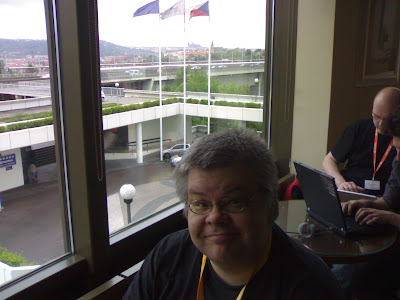

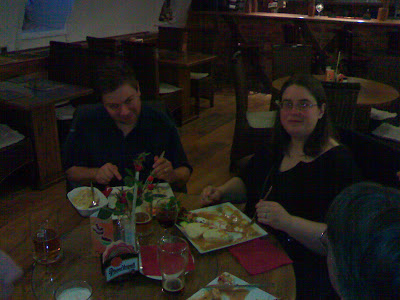
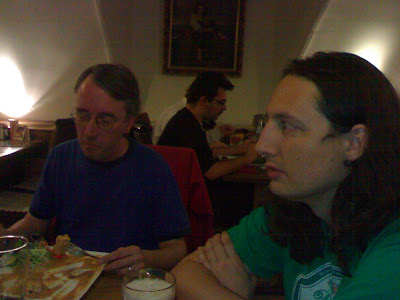
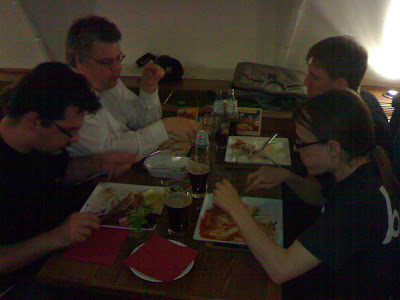
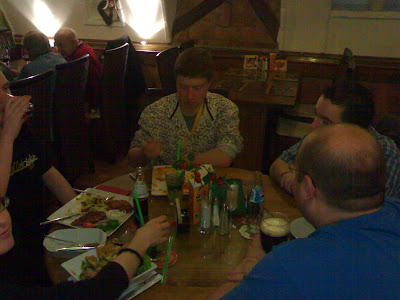
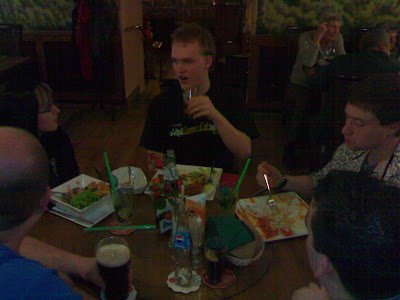
 Riku Voipio just sent a "bits from armel porters" in debian-devel-announce (sorry, no link: I'm offline while writing this).
I just want to point out that the success of armel becoming an official architecture is also due to the very clever and efficient way the porters interacted with maintainers.
As a very small example, Riku
Riku Voipio just sent a "bits from armel porters" in debian-devel-announce (sorry, no link: I'm offline while writing this).
I just want to point out that the success of armel becoming an official architecture is also due to the very clever and efficient way the porters interacted with maintainers.
As a very small example, Riku 
